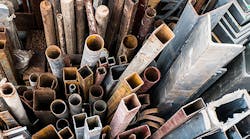China’s imports of steel scrap sank to zero last month for the first time this century, a milestone for the nation that’s tipped to turn into a significant exporter in the next decade.
The world’s top steel producer bought no scrap at all from overseas in August, according to customs data released on Sept. 23, capping years of dwindling volumes, after President Xi Jinping imposed sweeping curbs on all imports of solid waste to help protect the environment.
Purchases have fallen this year despite high iron ore prices and a tight domestic scrap market -- factors that would normally spur more imports.
In the short-term, the absence of scrap imports offers a modicum of support to iron ore, most of which is supplied by mines in Australia and Brazil and which vies with the secondary metal as a feedstock for steel mills. After 2020, China’s domestic scrap supply is expected to rise significantly as a wave of metal contained in everything from cast-off cars to demolished buildings flows back into the supply chain.
Scrap imports “will eventually face a far more significant barrier: growing domestic scrap supply,” consultancy Kallanish Commodities Ltd. wrote in a report on the global scrap trade. “We expect that China will likely be transformed into a net exporter of scrap steel in the long run.”
China is already the world’s biggest user of scrap by volume, although it lags well behind regions such as the U.S. and Europe in terms of the proportion of steel that’s derived from recycled metal. Scrap accounted for about a fifth of the iron content in its steel last year, according to the Bureau of International Recycling.
The government wants to boost the role of scrap and electric arc furnaces to reduce pollution from traditional iron ore-fed blast furnaces and to take advantage of a ready domestic source of raw material. But with overall steel output set to fall, it could end up with more scrap than it needs. At that point, the 40% tax on exports might be eased, according to Kallanish.
“This may only happen once authorities feel that scrap is sufficiently oversupplied that opening the export market will not create the risk of a price shock,” the report said.



